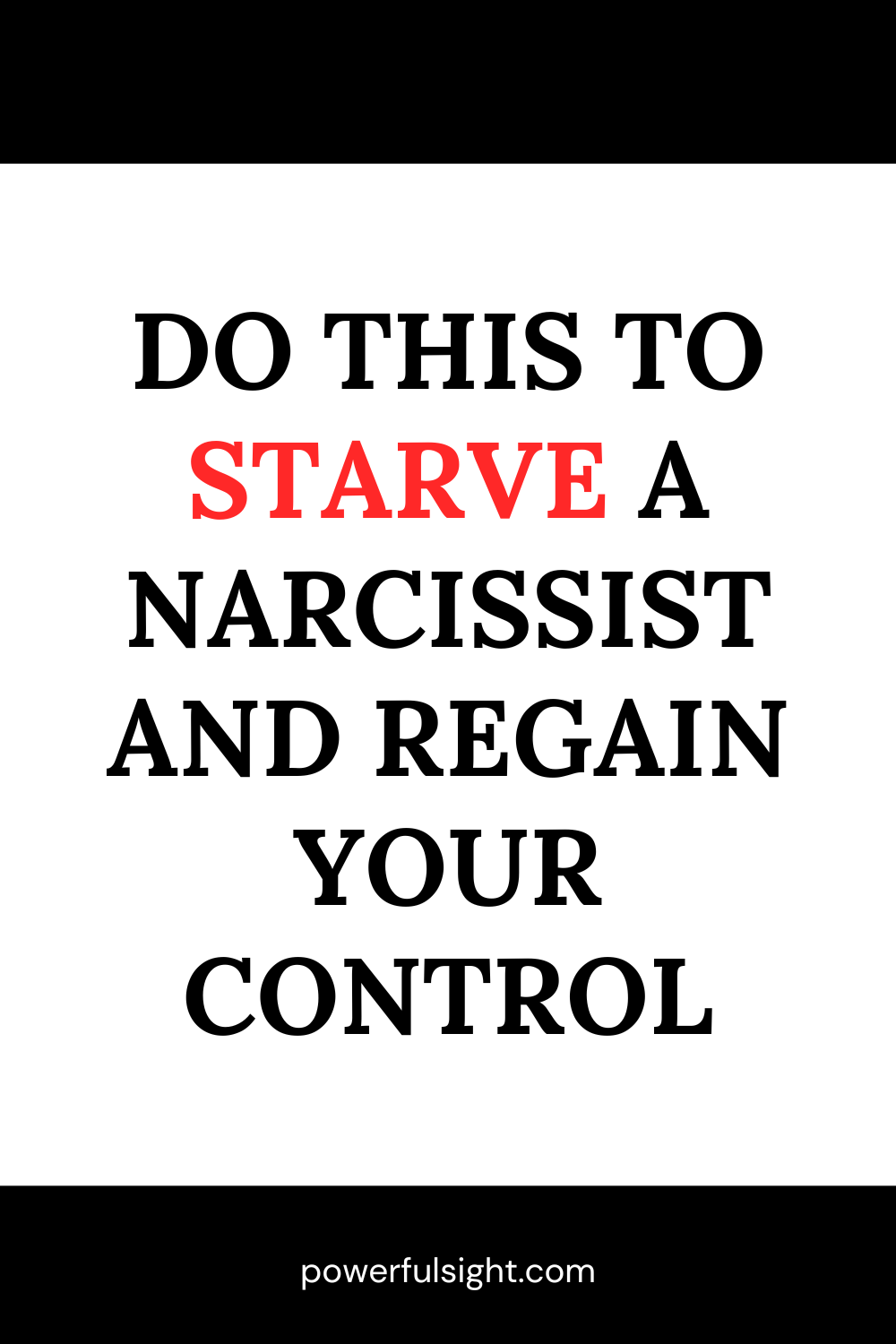If you spend time around narcissists, sooner or later you will hear someone say, “Starve a narcissist.” It is a catchy phrase, but it lacks real substance.
It is also an exaggeration. You are not literally going to starve someone. It is a metaphor for depriving a narcissist of the fuel they need to keep running their show.
Narcissistic people often thrive on the emotions of others. They will badger you for a reaction, stage dramatic scenes, or demand constant praise and attention.
If you stop supplying that fuel, they become powerless and lose control. That is the goal. Do it carefully, with your safety as the first concern.

How to starve a narcissist
1. Define what “supply” looks like
Narcissistic supply is any attention, control, outrage, or admiration they can extract from people around them. It may come in the form of attention and compliments, sympathy or guilt, anger, or even silence and personal information they can later use against you.
Common types of supply:
-
Attention and compliments
-
Anger, tears, guilt, and other emotional outbursts
-
Personal details you share about yourself
-
Social media posts or public recognition that reflects well on them
Once you know the type of supply they crave, you know what not to feed them.
Related: How To Make A Narcissist Tell You The Truth
2. Make simple, clear-cut boundaries
Boundaries are not punishments. They are agreements you make with yourself about how you will be treated.
Keep them short and clear. Practice a few lines ahead of time, and repeat them without debate.
Examples:
-
“I will not talk about this subject.”
-
“I will not be spoken to like that. We can continue when you are calm.”
-
“I do not answer calls or texts after 9 p.m.”
Do not bend the rules to allow exceptions. If you do, the boundary loses its meaning.
Related: How To Set Boundaries With A Narcissist
3. Grey rock method
If you must remain in contact with a narcissist, practice the grey rock method. Be boring. Keep conversations flat and brief. Do not share personal information. Do not display strong emotion.
Examples:
-
Reply with one or two neutral sentences.
-
Avoid stories, complaints, or life updates.
-
Keep your tone and expression flat.
You are not being cruel. You are protecting yourself. The goal is to reduce their power by making yourself uninteresting to exploit.
4. Withdraw attention
The thing a narcissist needs most is a reaction—any reaction. They create drama to provoke you. Withdrawing attention is the most effective tactic.
How to do it:
-
Stop engaging with their baiting or theatrics.
-
Avoid posting information online that they can twist against you.
-
Do not offer public achievements they can claim or distort.
-
If they stage a public scene, state your position once calmly, then disengage. Do not keep pushing back each time they escalate.
Related: How A Narcissist Brainwashes You
5. Do not bargain emotionally
A narcissist who has used the same tactics for years will not stop easily. They may apologize, act kind for a time, and then return to the same patterns.
Apologies alone are not proof of change. You are allowed to be skeptical. Judge them by actions over months, not words spoken in moments. One apology does not erase your right to keep your boundaries.

6. Guard your private life
Someone who has no access to your finances, schedule, or private thoughts has less power over you. Protect your privacy.
How to do it:
-
Never share passwords, access codes, or intimate details.
-
Separate joint finances by setting up your own independent accounts.
-
Keep your private life limited to a trusted few.
-
When you must interact, use written communication like texts or emails. This creates a record and reduces gaslighting.
7. Build your support network
You do not need to face this alone. Identify trustworthy people in your life and lean on them. Friends, family, therapists, or support groups can provide perspective and strength.
If you feel guilty for pulling away from a toxic dynamic, speak to someone on the outside. They will help you see why your boundaries are necessary.
Related: 7 Things Narcissists Don’t Want You To Know
8. Practice emotional self-care
Distancing yourself from a narcissist is not simple. You may feel angry, guilty, or sad. Expect those emotions—they are normal. Daily self-care helps you endure.
Examples of self-care:
-
Consistent routines for sleep, food, and exercise
-
Breathing or mindfulness practices for stress
-
Journaling to separate facts from emotions
-
Therapy to rebuild self-worth and process trauma
Self-care here is not indulgence. It is survival.
9. Script your lines in advance
A narcissist often rehearses their manipulations. If you prepare your responses in advance, you will not be caught off guard. Keep them short, factual, and calm.
Examples:
-
“I will not discuss this with you.”
-
“I hear you. I will think about it and respond later.”
-
“That comment is not acceptable. I am ending this call.”
Prepared language helps you stay consistent and dignified.
Related: How To Live With A Narcissist
10. Cutting off contact
You are not obligated to stay in repeated, insulting, or threatening contact with anyone. If the person becomes violent, abusive, or stalks you, cutting contact may be necessary—and you should seek help from authorities.
How to do it:
-
Change locks, phone numbers, and passwords if needed.
-
Document incidents and threats.
-
Seek legal advice or restraining orders if necessary.
-
Work with a trusted friend or professional to create a safety plan.
Breaking free can feel impossible, but start small. Take one step at a time with support.
11. Accept feelings of guilt
If you were raised to placate others, you may feel guilty for setting boundaries. The first time you say, “I don’t have to take this,” it may shock you. That is normal.
Remember: caring for your mental and emotional health is not selfish—it is necessary.
Reframe your actions:
-
You are choosing peace over chaos.
-
You are preserving your ability to love and trust in the future.
-
You are teaching others how you deserve to be treated.
Acceptance takes time. Do not judge yourself for the struggle.
Related: How To Handle A Narcissistic Partner
12. Legal and financial planning
If you share children, assets, or a business, get professional advice.
Do:
-
Consult with a trusted lawyer or financial expert.
-
Keep detailed records of finances and communications.
-
Avoid rash financial decisions that could backfire.
Careful planning limits their leverage and makes a clean break easier.
When to get professional help
Therapists do more than listen. They offer strategies for safety, boundaries, and healing from trauma. If you feel trapped or unsafe, seek professional help.
If children are involved, prioritize their well-being. Therapists and child welfare professionals can help you create a strong safety plan.
Final note
“Starving a narcissist” is not about revenge or humiliation. It is a survival strategy. You are not punishing them; you are protecting yourself. It works because narcissists depend on external validation. When you stop giving it, their tactics lose strength.
You will not always feel certain. You will have setbacks. That is normal. Keep your boundaries simple, protect your privacy, and seek support when you need it. Over time, the noise will fade, and you will regain the freedom to live on your own terms.
Save the pin for later

- 15 Fantasies Women Have That Their Husbands Don’t Know About - 09/01/2026
- 9 Signs He’s a Great Father But a Terrible Husband - 09/01/2026
- How To Be Charming In 2026 - 08/01/2026
